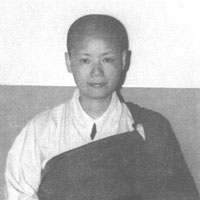|
beginningless time onward we have reveled in greed, hate, and stupidity;
we have stubbornly hung on to our own opinions; we can't see through and
put things down; we are confused and controlled by our false thoughts.
This is the burden of human existence. It binds people up so they can't
get free."
Faced
with the realization that the suffering in the world and even the world
itself is a manifestation of one's own karma, Heng Chai saw that her
fun-loving attitude and enjoyment of "pleasures" was really not
the best way to spend her life; that more important was to leave home and
cultivate the Way.
"When
we leave home we leave the ordinary home, the home of afflictions, the
home of birth and death, and the home of the Triple World. Leaving the
ordinary home means leaving your family-life and going to a temple to
cultivate. But still, in our minds, there is a lot of affliction. If we
don't cut off this affliction, then although we wear the robes, our minds
will not be at peace. So we must cultivate the mind-ground to leave the
home of afflictions.
"From
beginningless on we have turned in the cycle of birth and death without
cease. 'The aim of leaving home is to end birth and death and when we
leave the home of birth and death we also leave the home of the Triple
Realm, get off the turning wheel of rebirth, and can certify to the bliss
of Nirvana."
Heng
Chai left the home life under the Venerable Master on January 6, 1977, the
Anniversary of Sakyamuni Buddha's Enlightenment. As a novice she perfects
deportment and truly puts all her heart into the establishment of the City
of Ten Thousand Buddhas Bodhimanda so it can become an orthodox place of
practice. Before the Buddhas and Bodhisattvas she bows, recites sutras and
mantras, and performs the Great Compassion Repentance to eradicate karmic
offenses. Within the community she does administrative duties, gardens in
the Field of Blessings and prepares the vegetables it yields, works in the
library, and is always ready and willing to do whatever task is at hand.
"The
most important part of leaving home is to leave home in your mind. You
have to cultivate your mind with whatever Buddhadharmas your teacher
guides you to study. The path of cultivation is not easy to walk because
as we go we have to pull out all our overgrown habits and faults. It's
really not easy! As soon as we get rid of one bad habit another crops up
in its place!"
Heng
Chai has memorized the Surangama Mantra and studies the Daily Vinaya and
precepts and rules of deportment in preparation for her full ordination.
"Sooner
or later, no matter who you are, you have to walk the Way. Otherwise you
won't ever stop turning in the wheel of rebirth where it's easy to go from
being a person to being an animal or even a hungry ghost. The whole
process is very frightening.
"The
entire extent of our human lifespan is but a few decades, how pitiful if
we merely spend it on fending for a day-to-day existence. Better that we
prepare for where we're going next. Don't be one who doesn't ordinarily
light incense (before the Buddhas) but who on the verge of death nervously
clutches at the Buddha's feet.
"We
can be fun-loving and goof off in some ways, perhaps, but whatever you do,
don't take birth and death lightly. If you're not careful you can fall
into the three evil paths and then if you want to cultivate it will be too
late. As the ancients put it:
If you don't save yourself in this life,
In what life do you intend to do so?
"So
it would be better to cultivate a little earlier and attain liberation
sooner." |
